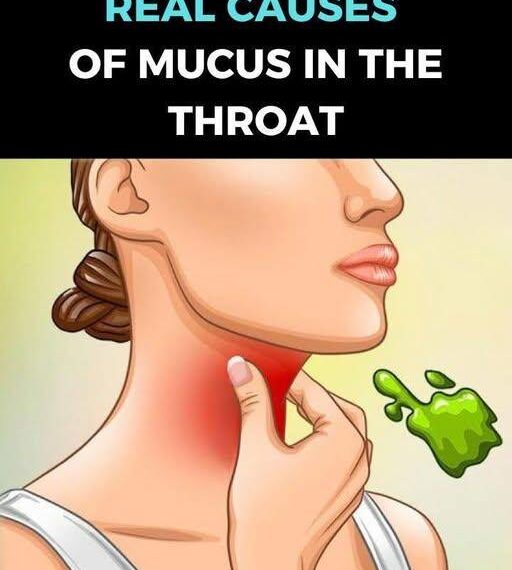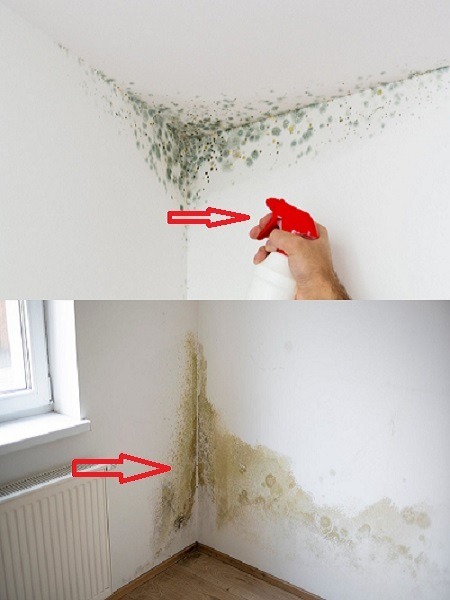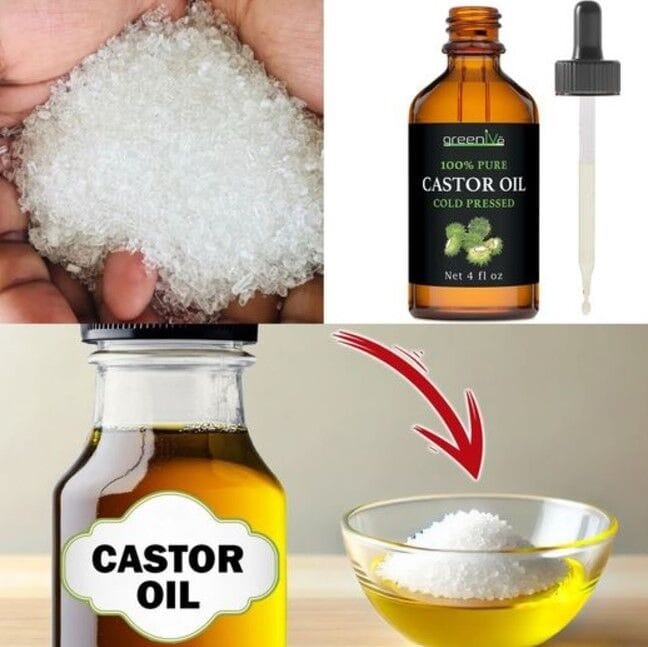Do you ever feel like you’re constantly clearing your throat, coughing up sticky mucus, or dealing with a persistent “lump” in your throat? You’re not alone. Many people experience excessive phlegm or mucus, and while it may seem harmless, it can be uncomfortable and, in some cases, signal underlying issues that need attention.
The human body naturally produces mucus to lubricate and protect the throat, sinuses, and lungs. Mucus traps dust, bacteria, and other particles, preventing them from entering your respiratory system. But when this production becomes excessive, it’s often a sign that something isn’t quite right.
In this article, we’ll explore the main causes of constant phlegm and mucus in the throat, as well as natural strategies to reduce it safely and effectively.
1️⃣ Acid Reflux (GERD)
Acid reflux, or gastroesophageal reflux disease (GERD), occurs when stomach acid flows back up into the esophagus. This can irritate the throat and trigger an increase in mucus production.
🔹 How It Shows Up:
- Feeling of a lump in the throat
- Chronic cough or throat clearing
- Sore throat, especially in the morning
- Heartburn or chest discomfort
🔹 Natural Ways to Manage Acid Reflux:
- Eat smaller, more frequent meals instead of large meals.
- Avoid trigger foods like spicy dishes, citrus, tomato-based sauces, and caffeine.
- Elevate the head of your bed by 6–8 inches to prevent nighttime reflux.
- Maintain a healthy weight, as excess belly fat can worsen reflux.
- Try sipping warm water with a teaspoon of honey or ginger tea to soothe irritation.
2️⃣ Postnasal Drip
Postnasal drip occurs when mucus from the sinuses drips down the back of the throat, often due to allergies, sinus infections, or cold weather. This is one of the most common reasons people experience constant throat mucus.
🔹 How It Shows Up:
- Feeling like something is stuck in your throat
- Frequent throat clearing
- Coughing at night or first thing in the morning
- Tickling sensation in the throat
🔹 Natural Ways to Reduce Postnasal Drip:
- Stay Hydrated: Water thins mucus, making it easier to drain.
- Steam Inhalation: Breathing in steam from a hot shower or bowl of water can loosen thick mucus.
- Saline Nasal Rinse: Using a neti pot or saline spray helps flush out allergens and mucus.
- Allergen Management: Keep your living space clean, use HEPA filters, and avoid triggers like dust, pollen, and pet dander.
3️⃣ Respiratory Infections
Cold, flu, and sinus infections often cause temporary increases in mucus. Your body produces extra phlegm to trap viruses and bacteria, which is why coughing and throat clearing are common.
🔹 How It Shows Up:
- Thick yellow or green mucus
- Fever, fatigue, or body aches
- Congestion and sinus pressure
- Coughing fits
🔹 Natural Ways to Support Recovery:
- Rest: Give your body time to fight the infection.
- Warm Liquids: Herbal teas, broths, and warm water help thin mucus.
- Honey: Has natural antimicrobial properties and soothes a sore throat.
- Gargle with Salt Water: Reduces inflammation and kills bacteria in the throat.
4️⃣ Smoking and Air Pollution
Smoking and exposure to environmental pollutants irritate the airways and increase mucus production. Smokers often notice a persistent “morning phlegm,” while those in polluted areas may cough more frequently.
🔹 How It Shows Up:
- Thick, sticky phlegm in the morning
- Chronic cough
- Wheezing or shortness of breath
- Throat irritation
🔹 Natural Ways to Reduce Impact:
- Quit smoking or limit exposure to secondhand smoke.
- Use air purifiers to remove pollutants and allergens from your home.
- Drink plenty of water to help flush toxins from your system.
- Incorporate antioxidant-rich foods like berries, leafy greens, and nuts to help reduce inflammation.
5️⃣ Food Sensitivities and Diet
Certain foods can trigger excessive mucus production in sensitive individuals. Dairy, gluten, and highly processed foods are common culprits. While not everyone reacts the same way, monitoring your diet can help identify triggers.
🔹 How It Shows Up:
- Feeling “stuffy” after consuming certain foods
- Increased throat clearing
- Mild congestion or postnasal drip
🔹 Natural Ways to Reduce Food-Related Mucus:
- Keep a food diary to track symptoms and identify triggers.
- Replace dairy with non-dairy alternatives if necessary.
- Focus on a balanced diet rich in fruits, vegetables, and lean proteins.
- Drink herbal teas like peppermint or chamomile, which may help reduce mucus.
6️⃣ Chronic Conditions
Sometimes, persistent phlegm is linked to long-term health conditions such as:
- Asthma: Excess mucus is a common symptom, especially at night.
- Chronic bronchitis: Often caused by smoking or repeated respiratory infections.
- Allergic rhinitis: Seasonal or year-round allergies increase mucus production.
🔹 How It Shows Up:
- Daily or frequent throat clearing
- Wheezing or shortness of breath
- Coughing with thick mucus
- Symptoms that worsen in certain environments
🔹 Natural Ways to Manage Chronic Conditions:
- Work with a healthcare provider to identify triggers.
- Use humidifiers to keep airways moist.
- Practice breathing exercises or gentle exercise to improve lung function.
- Maintain good hydration and a nutrient-rich diet to support immune health.
💧 General Strategies to Reduce Mucus Naturally
Even if your mucus buildup has a specific cause, there are universal strategies that can help you manage it:
- Hydration – Drink at least 8–10 glasses of water per day. Hydrated mucus is thinner and easier to clear.
- Warm Liquids – Herbal teas, broths, and warm water with lemon can soothe your throat and reduce irritation.
- Steam Therapy – Inhaling steam or using a humidifier helps loosen mucus in the throat and sinuses.
- Salt Water Gargle – Mix ½ teaspoon salt in a glass of warm water and gargle 2–3 times a day. It reduces inflammation and clears mucus.
- Avoid Irritants – Cigarette smoke, strong perfumes, and air pollutants worsen mucus production.
- Elevate Your Head During Sleep – This helps prevent mucus from pooling in the throat overnight.
- Spicy Foods (in moderation) – Ingredients like chili, ginger, and garlic can temporarily thin mucus.
🌿 When to See a Doctor
While most cases of excess mucus are harmless and temporary, certain warning signs mean you should seek medical attention:
- Mucus that’s green, brown, or bloody for more than a week
- Severe or persistent sore throat, fever, or chest pain
- Wheezing or shortness of breath
- Symptoms that don’t improve with home remedies
A healthcare professional can identify underlying conditions like infections, reflux, or chronic respiratory issues and recommend targeted treatments.
✅ Final Thoughts
Excess phlegm and mucus in the throat can be frustrating, but understanding the causes and taking proactive steps makes a huge difference. Whether it’s acid reflux, postnasal drip, infections, smoking, or dietary triggers, natural strategies like staying hydrated, steam therapy, salt water gargles, and dietary adjustments can help reduce symptoms.
Remember, the body produces mucus for a reason—it’s protecting you. But when it becomes excessive, it’s a signal to pay attention to your health. By understanding the root causes and adopting simple, natural solutions, you can regain comfort, clarity, and peace of mind.
So next time you feel that sticky, constant phlegm in your throat, don’t just sigh and ignore it—take action. Your throat (and your overall health) will thank you.





